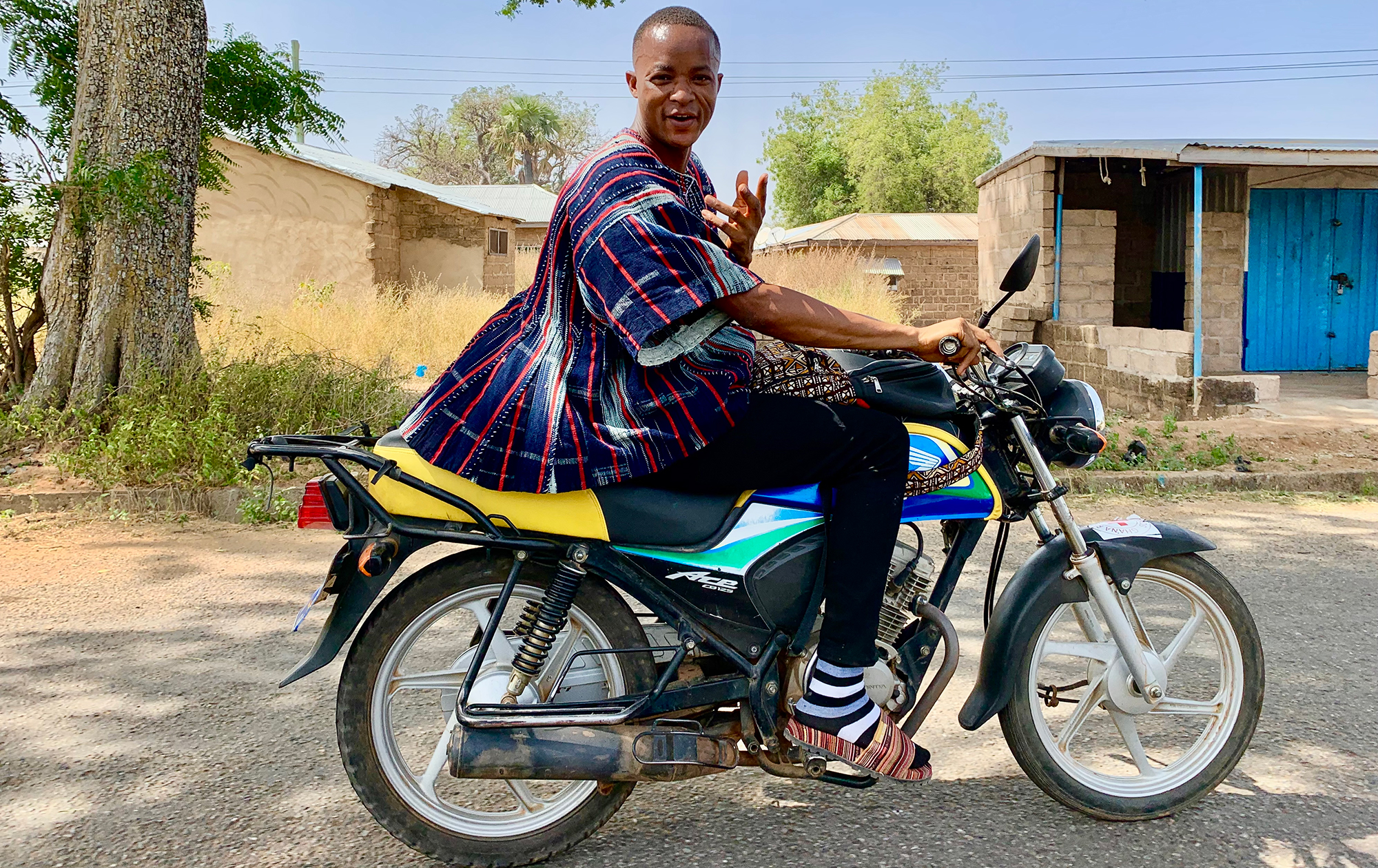
BACKGROUND
How long have you been selling baskets? How old were you? I have been feeling baskets since 2002. It has been 23 years now. I am now 34 years of age. I started at the Nyariga Junction Market when I was about 11 years old. I would go with my mother to the market to help my mother things. She sold kola nuts, tobacco, pipes and other smoking products, along with spices.
Why did you decided to get into the basket business? My older brother started selling baskets in Accra and he would come home to buy baskets and he got me interested in selling. He showed me how to run the business…
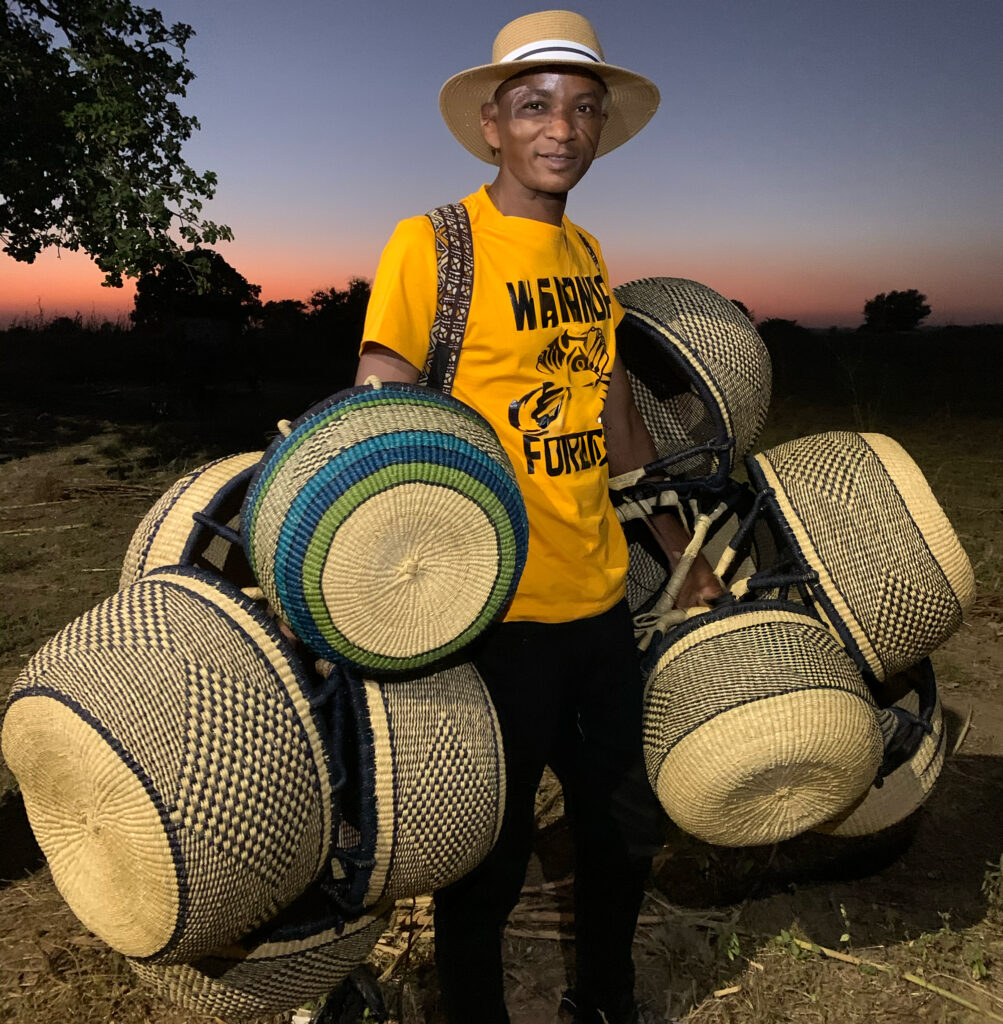 When you were a child, did anyone in your family weave? If someone did weave, did you participate or help? Everyone in my family was a weaver with the exception of my father. So my mother, my brothers, my sisters all were weavers. We are a family of nine. My mother had seven children. My older sister was more committed to weaving and use the craft to support the family. She was a top weaver. My father had about 5 wives.
When you were a child, did anyone in your family weave? If someone did weave, did you participate or help? Everyone in my family was a weaver with the exception of my father. So my mother, my brothers, my sisters all were weavers. We are a family of nine. My mother had seven children. My older sister was more committed to weaving and use the craft to support the family. She was a top weaver. My father had about 5 wives.
Did you learn to weave? I can weave but do not do to sell. I weave to make repairs on damaged baskets and sometimes when I am in Bolgatanga, I will help the weavers in the village to finish some orders.
What countries do you ship your baskets to? Most of my baskets go to the United States, Canada, and Germany. At my roadside shop in Accra, I sell to people who come from all over the world. Italy, Japan, Netherlands and beyond.
What challenges or difficulties do you have in your business selling baskets? Right now, my challenges are a result of high rents in Accra. It is expensive to maintain my stand because now in Accra, landlords are charing US dollars so it is difficult to find places to safely store my baskets.
Foreigners are coming into the market to buy up local baskets from weavers and weaving groups. These buys are driving up the prices of the baskets because they are using foreign dollars that are more powerful than the Ghana Cedi. So now weavers are more attracted to foreigners to sell because they pay more than the local wholesalers and this is creating a strain in the market because baskets are less affordable.
Then annually, when it is rainy season, baskets are more expensive because weavers are concentrating on planting their farms and raising the crops to sustainability. After farming, many weavers are tired and do not weave. So those that are weaving are able to charge more because supplies are low in the market.
One of the biggest issues facing all weavers is because the materials are getting very expensive. Our grasses come from the Kumasi region in Ghana. The lands where the grass is grown is slowly being sold so this means that there is less grass being grown because people are building homes and using the lands for other crops. This leads to a higher cost of a finished baskets.
From a wholesale perspective, in 2020, a completed Bolga shoppers basket was about 60 cedis. Now in 2025, the same basket is over 120+ cedis. This does not include the increased cost to get the baskets from the village to the markets or finishing with leather trims. In 2020, it was 50 cedis send a late bag of baskets to Accra, now the cost in 2025 is about 150 cedis.
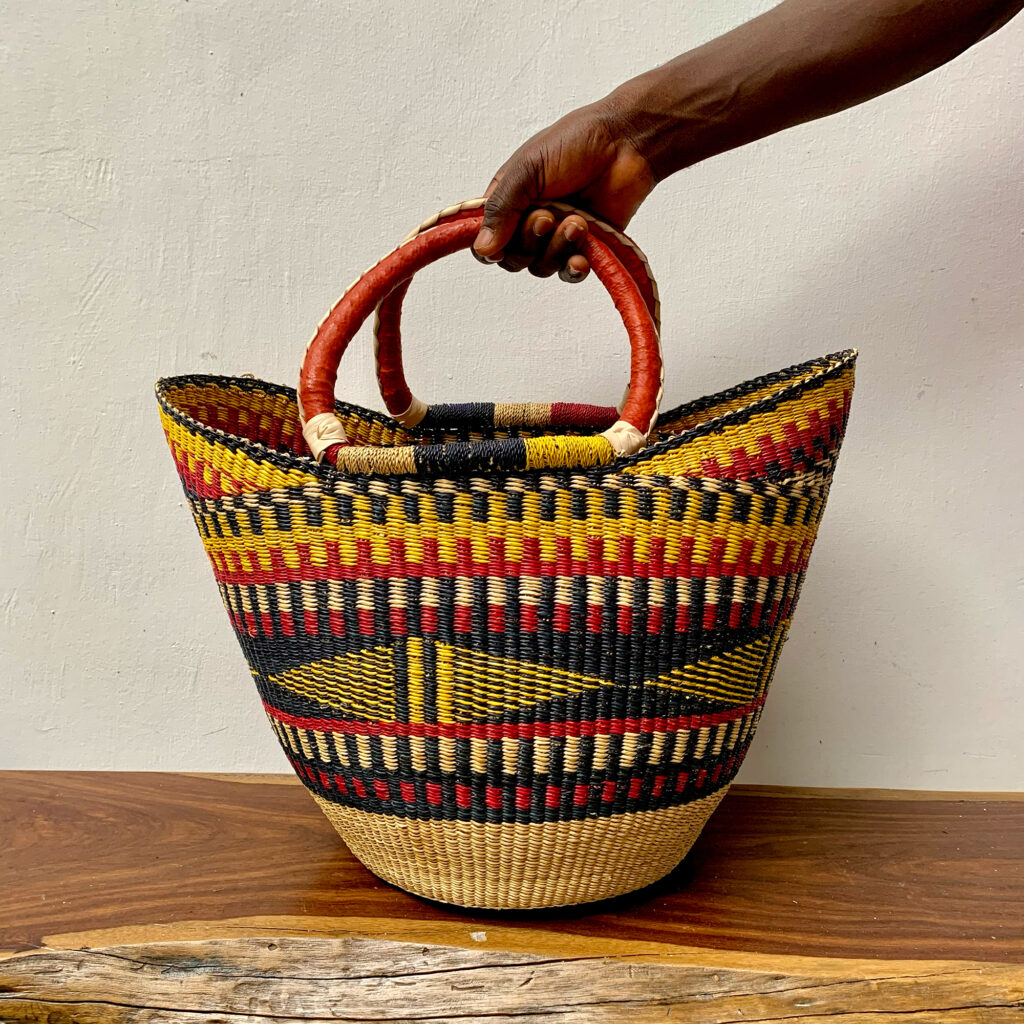 How does your work support the village? These days, I am able to meet so many people that come from around the world that are fascinated by our baskets. Many of these customers are interested in visiting the villages and we arrange for them to go. This has helped us generate money to build a new weaving center for the women to keep the craft growing.
How does your work support the village? These days, I am able to meet so many people that come from around the world that are fascinated by our baskets. Many of these customers are interested in visiting the villages and we arrange for them to go. This has helped us generate money to build a new weaving center for the women to keep the craft growing.
These people spend money and help us by telling their friends to come.
Customers are inspired and offer donations to support. These donations are cash and supply support, including clothing.
COMMUNITY PERSPECTIVE
What is the typical role of women in Bolgatanga. What are they responsible for when it comes to the family.
The role of women in Bolgatanga includes keeping the home clean, taking care of the children—bathing them, cooking for them, and watching over them. Additionally, women are responsible for preparing meals for the family and maintaining a tidy household.
Are women responsible for providing money to help the family manage or is it the man’s responsibility.
Women in Bolgatanga are generally not responsible for providing money for the family. However, in cases where the man is poor, the woman may also contribute financially if she has the means.
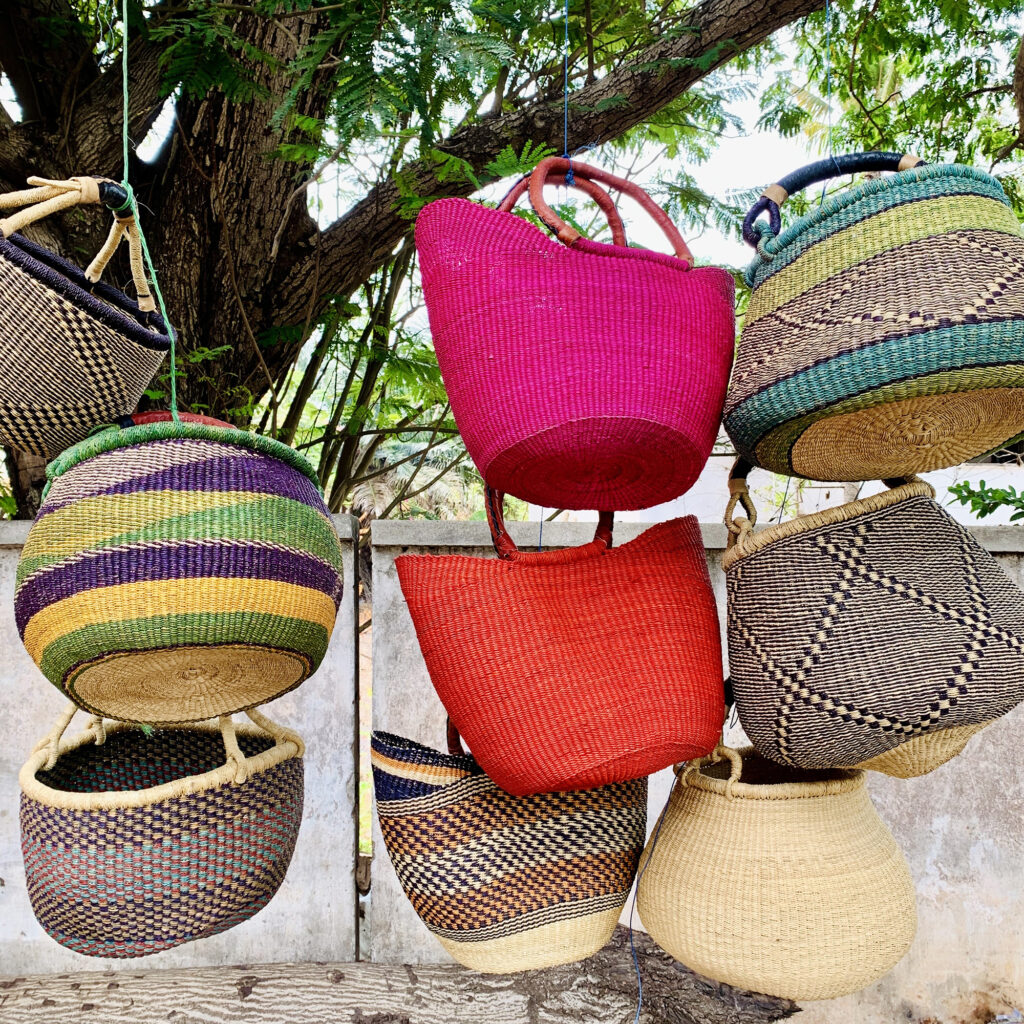 How long does it typically take for someone to learn how to weave and what does it mean to be a master weaver?
How long does it typically take for someone to learn how to weave and what does it mean to be a master weaver?
Learning how to weave depends on regular and persistent participation. It can take six months to a year to learn the basics, and becoming a master weaver requires the ability to create different types of designs and consistently produce high-quality baskets.
When women sell their baskets, are they allowed to keep their own money?
Yes, women are allowed to keep the money they earn from selling their baskets, but due to poverty, they are often compelled to use it to provide for their children.
Do women teach the children to weave? If they do, at what age do they learn to weave or if they do not weave, do they do other basket related work like breaking the grass, dying?
Yes, women teach the children how to weave. Some children start as early as age 10, while others begin around age 15—it depends on the family’s financial situation. They start by learning how to split and twist the straw. As for dyeing, they are taught that after they’ve learned how to weave.
Do the women weavers work in groups mostly or are there some that work by themselves? Or is it a mix of both?
Yes, it’s a mix—some women work in groups, while others work independently.
How important is basket weaving to the people of Bolgatanga?
Basket weaving is a source of income for 80% of women in Bolgatanga, making it a vital part of life for our community.


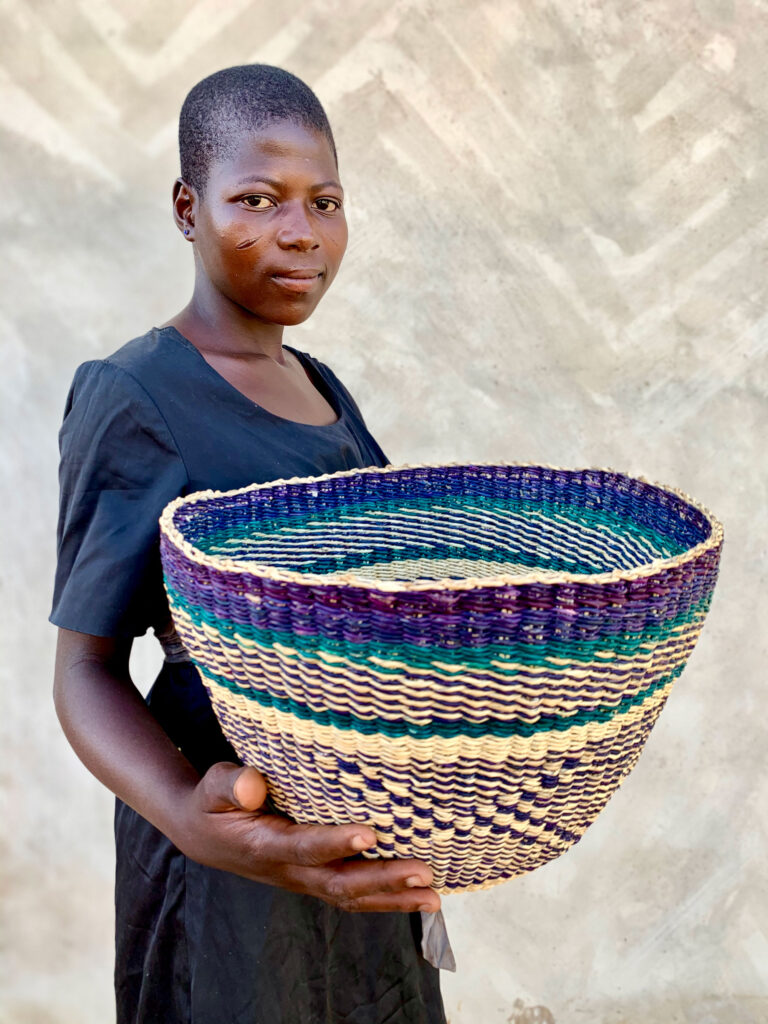 HOW DID WE GET HERE: In March 2020, I was in Ghana, West Africa—swept up in the rising international fears of COVID-19 approaching the continent.
HOW DID WE GET HERE: In March 2020, I was in Ghana, West Africa—swept up in the rising international fears of COVID-19 approaching the continent.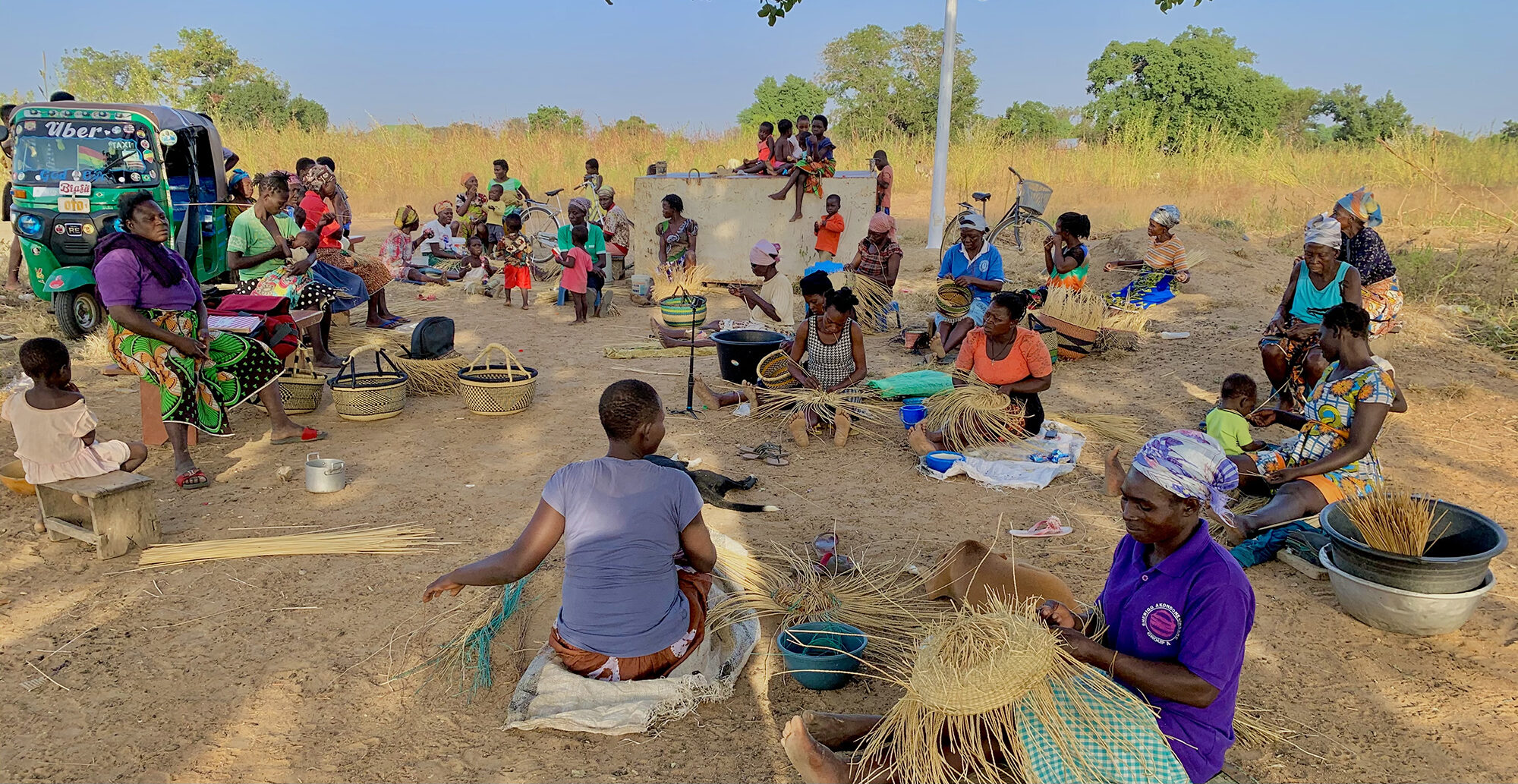
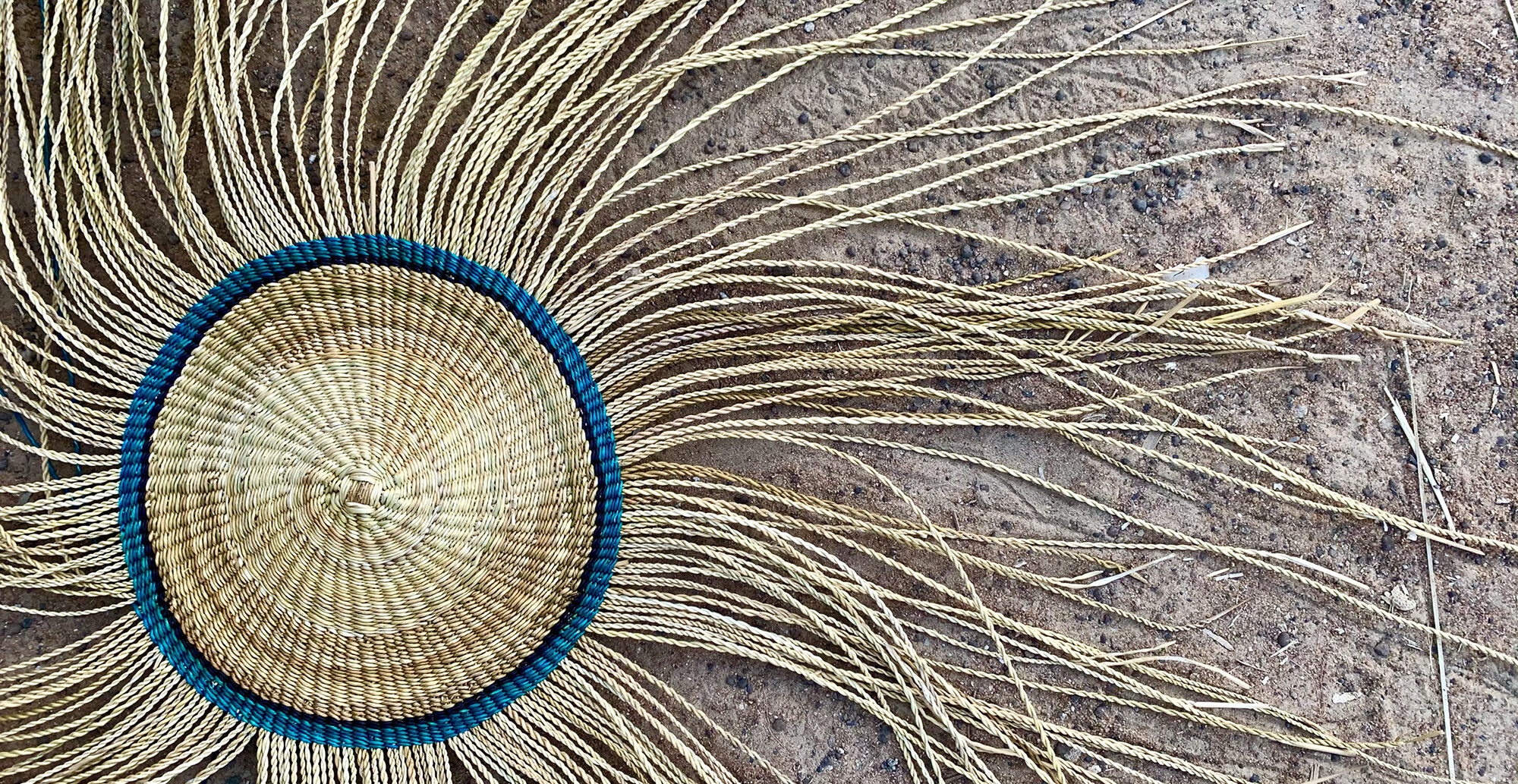
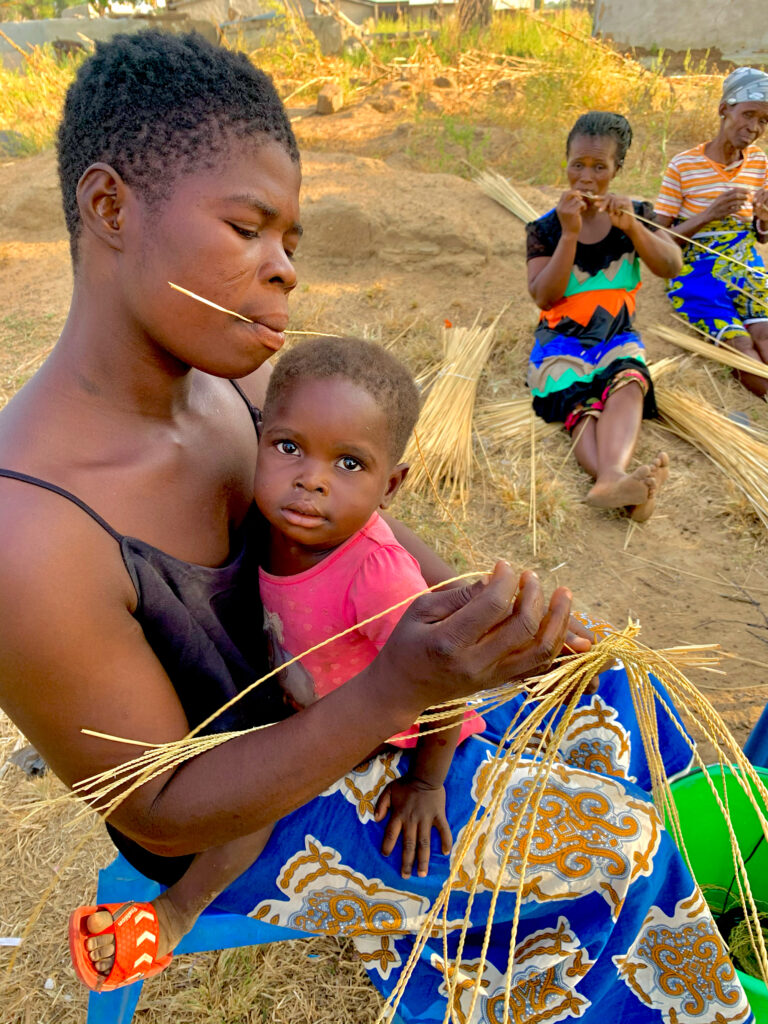 After a night’s rest, I woke up ready to continue exploring life in Bolgatanga. Over breakfast, Prosper and I organized our day. Our plans included watching him purchase baskets at the local market—separate from the weavers of Sherigu—and then visiting the weaving community, where we would provide snacks and beverages for the women and children.
After a night’s rest, I woke up ready to continue exploring life in Bolgatanga. Over breakfast, Prosper and I organized our day. Our plans included watching him purchase baskets at the local market—separate from the weavers of Sherigu—and then visiting the weaving community, where we would provide snacks and beverages for the women and children.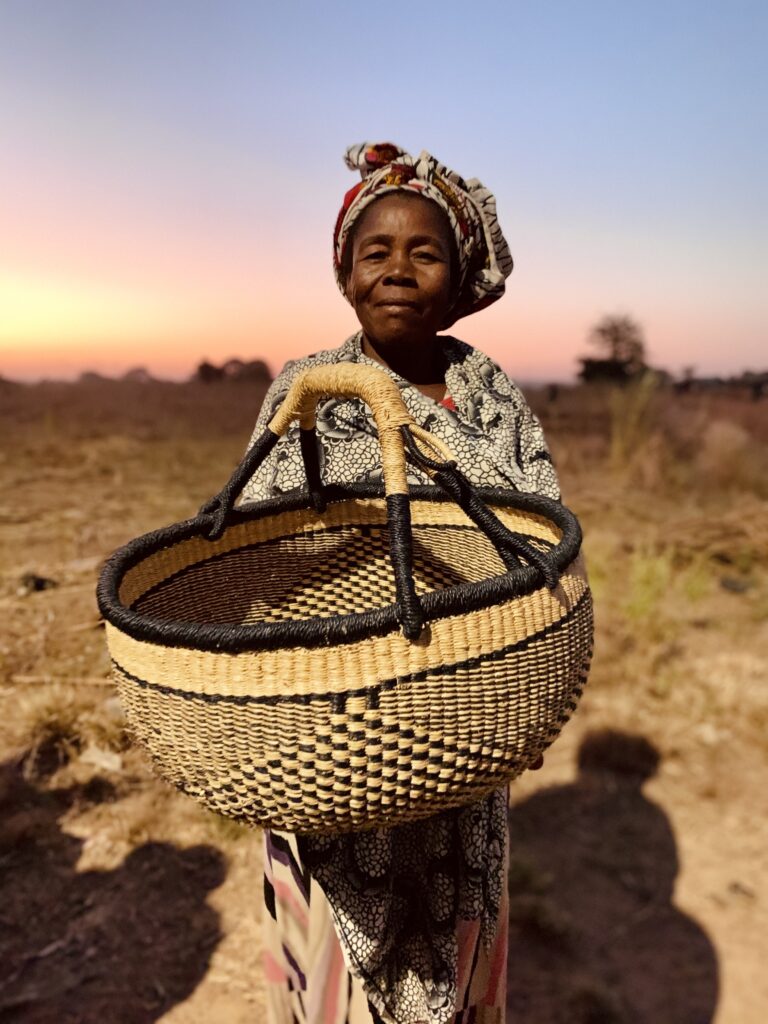
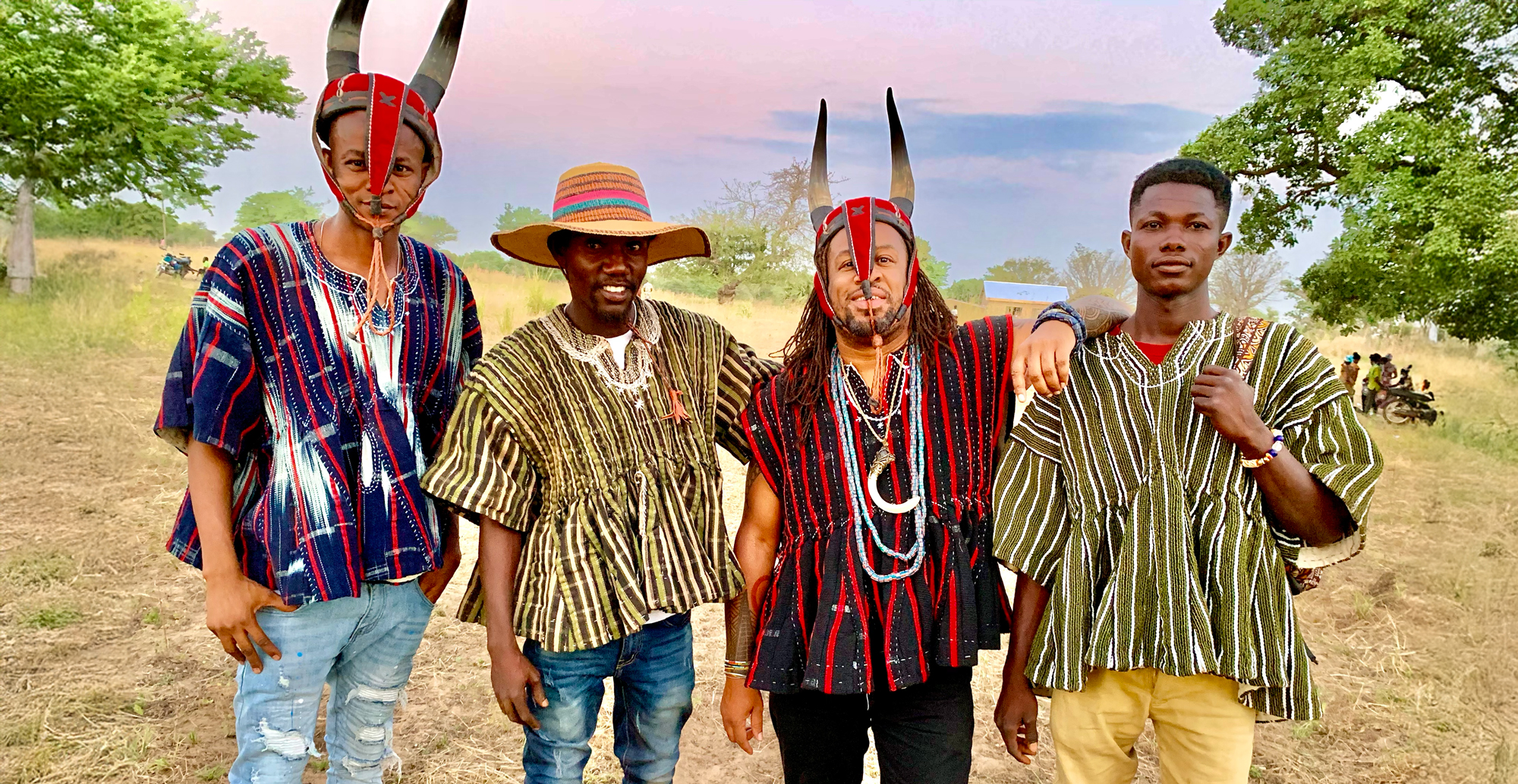 On my last day in Bolgatanga, Prosper arranged for us to do some final market shopping at a smaller venue focused on primary on fans and some baskets. He took time to teach me what he specifically looks for in the baskets he sells in Accra. I got a fast lesson on how to distinguish quality levels, assess seamless patterns, and evaluate color consistency. It was fascinating! While buying, you only have seconds to preview an item—hesitate too long and someone else will scoop it up. Attention to detail is essential.
On my last day in Bolgatanga, Prosper arranged for us to do some final market shopping at a smaller venue focused on primary on fans and some baskets. He took time to teach me what he specifically looks for in the baskets he sells in Accra. I got a fast lesson on how to distinguish quality levels, assess seamless patterns, and evaluate color consistency. It was fascinating! While buying, you only have seconds to preview an item—hesitate too long and someone else will scoop it up. Attention to detail is essential.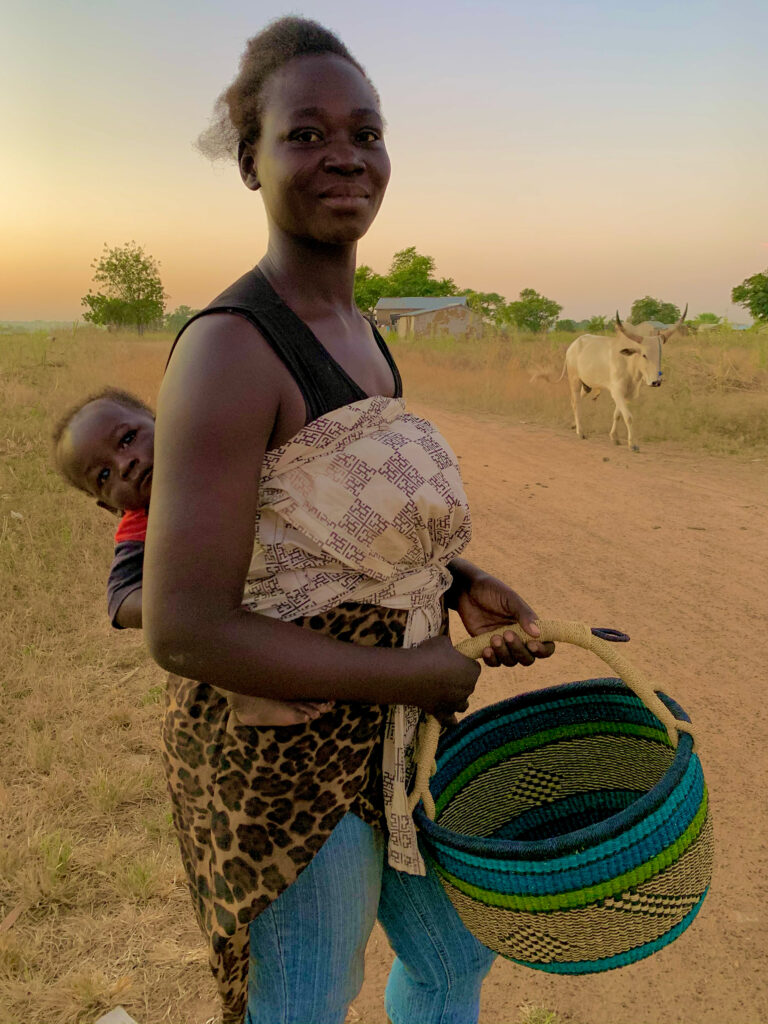 With more market experience under my belt, we hopped on our motorbikes and made a special trip to Prosper’s family compound. There, he introduced me to his relatives and friends while offering a glimpse into what life is like in a northern compound.
With more market experience under my belt, we hopped on our motorbikes and made a special trip to Prosper’s family compound. There, he introduced me to his relatives and friends while offering a glimpse into what life is like in a northern compound.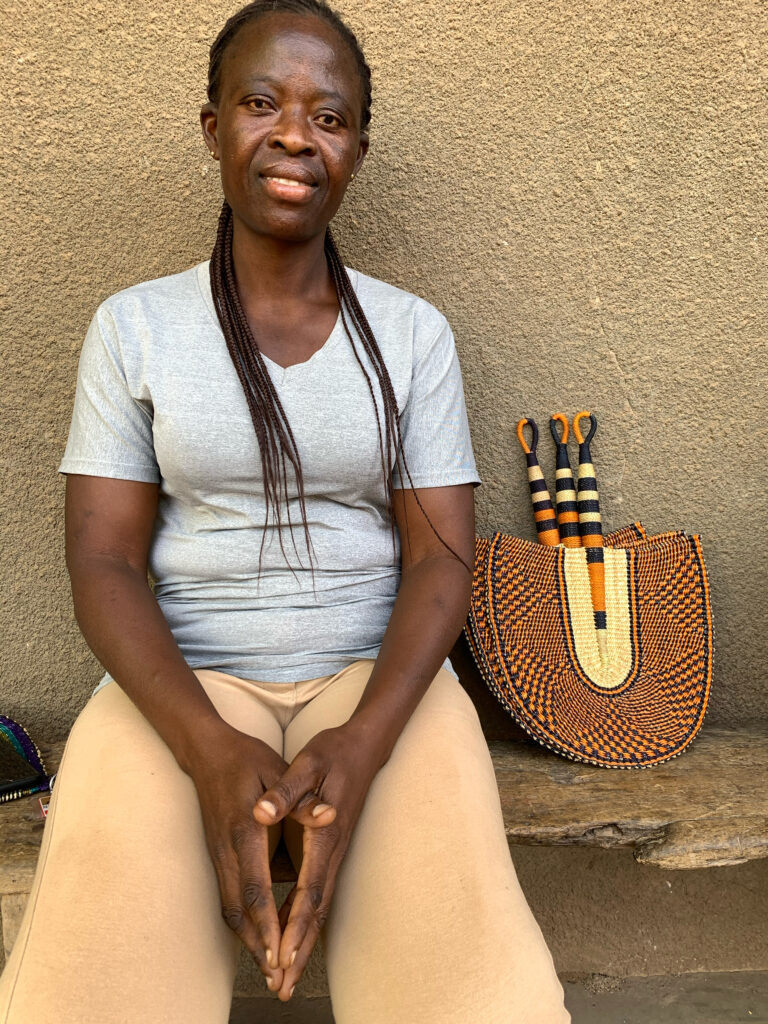 Batakari, also known as fugu, are smocks traditionally worn by men in northern Ghana. They are appropriate for a range of occasions—from office work and school to weddings and funerals. Ironically, I was invited to a funeral—a major one—for the mother of rapper Guy One. So we adjusted our departure plans.
Batakari, also known as fugu, are smocks traditionally worn by men in northern Ghana. They are appropriate for a range of occasions—from office work and school to weddings and funerals. Ironically, I was invited to a funeral—a major one—for the mother of rapper Guy One. So we adjusted our departure plans.
 When you were a child, did anyone in your family weave? If someone did weave, did you participate or help? Everyone in my family was a weaver with the exception of my father. So my mother, my brothers, my sisters all were weavers. We are a family of nine. My mother had seven children. My older sister was more committed to weaving and use the craft to support the family. She was a top weaver. My father had about 5 wives.
When you were a child, did anyone in your family weave? If someone did weave, did you participate or help? Everyone in my family was a weaver with the exception of my father. So my mother, my brothers, my sisters all were weavers. We are a family of nine. My mother had seven children. My older sister was more committed to weaving and use the craft to support the family. She was a top weaver. My father had about 5 wives. How does your work support the village? These days, I am able to meet so many people that come from around the world that are fascinated by our baskets. Many of these customers are interested in visiting the villages and we arrange for them to go. This has helped us generate money to build a new weaving center for the women to keep the craft growing.
How does your work support the village? These days, I am able to meet so many people that come from around the world that are fascinated by our baskets. Many of these customers are interested in visiting the villages and we arrange for them to go. This has helped us generate money to build a new weaving center for the women to keep the craft growing. How long does it typically take for someone to learn how to weave and what does it mean to be a master weaver?
How long does it typically take for someone to learn how to weave and what does it mean to be a master weaver?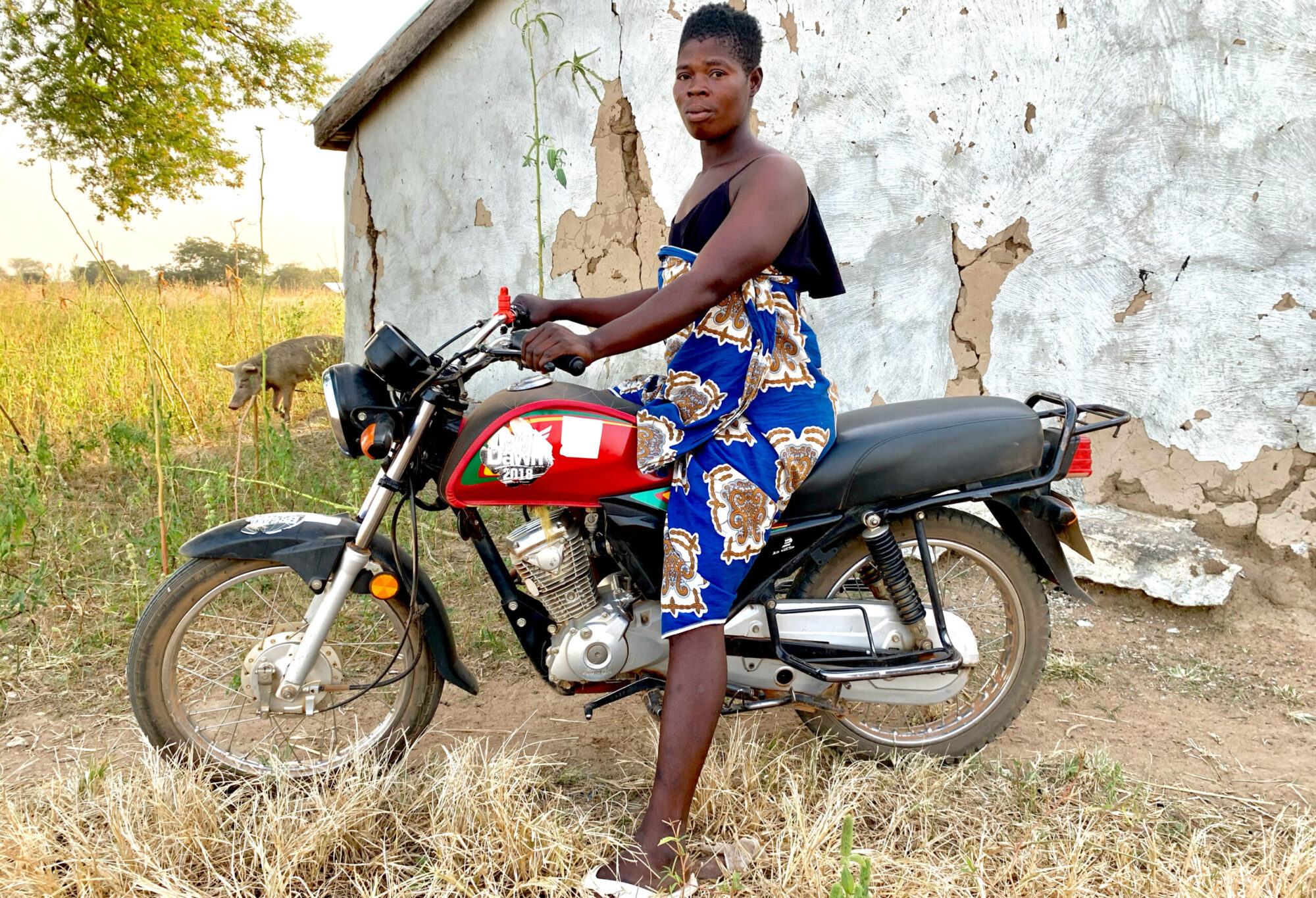 Voyage to Bolgatanga began as a self-funded journey in 2020 after a chance encounter in Accra led me to the village of Sherigu in northern Ghana. There, I connected with a community of Frafra women who weave the iconic Bolga baskets—an art form that not only supports their families but also carries deep cultural and generational significance. These baskets are known around the world, yet the stories of the women who make them are rarely told.
Voyage to Bolgatanga began as a self-funded journey in 2020 after a chance encounter in Accra led me to the village of Sherigu in northern Ghana. There, I connected with a community of Frafra women who weave the iconic Bolga baskets—an art form that not only supports their families but also carries deep cultural and generational significance. These baskets are known around the world, yet the stories of the women who make them are rarely told.










































